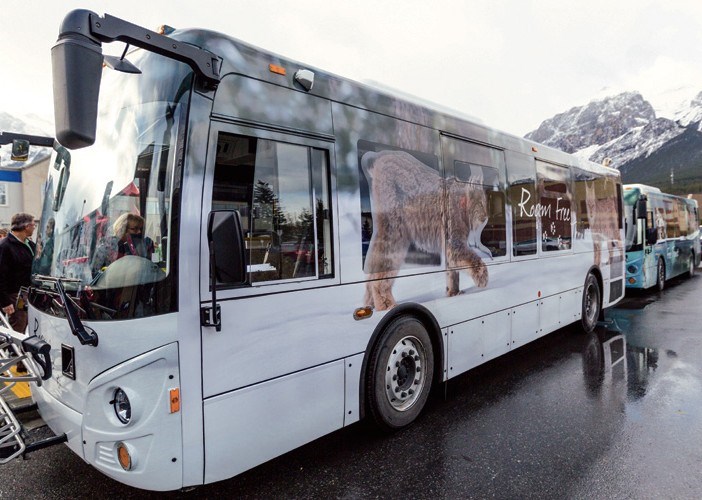BOW VALLEY – Bus riders will soon have a more environmentally friendly and seamless transit experience thanks to more than $5.7 million in provincial funding announced at the beginning of March.
The Bow Valley Regional Transit Authority will use the money to help pay for five projects including $2.1 million to build new transit infrastructure in Canmore, $2 million for a pedestrian bridge over the Bow River in Banff, $1.35 million to purchase two electric buses, $180,000 for ticket vending machines and $100,000 for driver training.
“Investing in transit is investing in the future of the Bow Valley and we are absolutely thrilled with the support and vote of confidence from the Alberta government to make the Bow Valley transit system greener and easier for visitors and residents,” said Corrie DiManno, Roam Transit’s marketing and communications coordinator.
The transit commission was one of 17 transit systems across the province selected to share $215 million over four years from the new Alberta Community Transit Fund, which was launched in August 2018.
The funding represents 40 to 50 per cent of the total estimated cost for each project.
The biggest sum of money was $2.1 million to build new infrastructure for local and regional transit in Canmore as outlined in its 2018 Integrated Transportation Plan.
The plan includes bus stop improvements, accessible pathways, improved sidewalk and cycling connections and contributions towards a protected intersection with bicycle signals at Railway Avenue and Bow Valley Trail. Pedestrian lighting will also be installed at under lit stops throughout the system.
“We have made transit a priority in Canmore, and as the community continues to grow and evolve, the need for a well-integrated public transit system becomes more pressing,” wrote Vi Sandford, Canmore’s deputy mayor.
“The Alberta Community Transit Funding will help create the infrastructure to enable a growing number of our residents and visitors to travel more often by bus, foot, and bicycle.”
The total cost of the capital project is $5.27 million, the majority of which is expected to be paid for by government grants including the Municipal Sustainability Initiative, Investing in Canada Plan and the Federal Gas Tax Fund.
The provincial funding announcement on March 7 also included $2 million for a new pedestrian and cyclist bridge in Banff spanning the Bow River between Central Park and the Recreation Grounds.
The new bridge, which is estimated to cost up to $5 million and be completed by 2020, will improve access between downtown and the south side of the river and is expected to improve access to the public transit system.
In December, Banff administration said it was seeking $4.5 million in provincial and federal funding for the bridge, which if successful, would mean the municipality would pay $500,000.
Banff Mayor Karen Sorensen described the funding announcement as an “exciting first step,” but said more funding from the federal government will be needed before the bridge can be built.
“There is more money that needs to come forward and council will have to make decisions based on what we learn from the federal grant that we’ve applied for,” said Sorensen, adding she expects the federal government to make a decision by the summer.
The provincial funding announcement also included $1.35 million to replace the planned purchase of two diesel buses with two electric buses, including the charging infrastructure required to use them.
The buses are expected to help increase the frequency on Banff local routes and be used on longer routes to Lake Louise and Canmore to help reduce emissions. The total cost to buy the two buses is $2.7 million and they are expected to be delivered by the spring of 2020.
To ensure drivers can operate the buses properly the provincial funding also included $100,000 for driver training technology. The total project is expected to cost $250,000.
According to the transit authority, the funding will help it purchase a driving simulator so drivers can practice and train on the different bus models of its existing fleet.
It will also allow drivers to mimic situations that would not be possible or safe with a real bus, such as winter driving and pedestrian or wildlife crossings.
To help make taking the bus as seamless as possible the province also earmarked $180,000 to help purchase ticket vending machines at key transit hubs and shelters in Banff, Lake Louise and Canmore.
The durable, weather resistant machines will allow riders to buy passes using coins, bills or credit cards. The project is expected to cost a total of $450,000.
“As we near the election, people often ask me what are you most proud of over the last four years and I like to think that transit is one of those top things because it really touches on a lot of various aspects of the constituency in terms of affordability, the environment and greenhouse gas emissions, tourism and helping people connect to services,” said MLA Cam Westhead.




